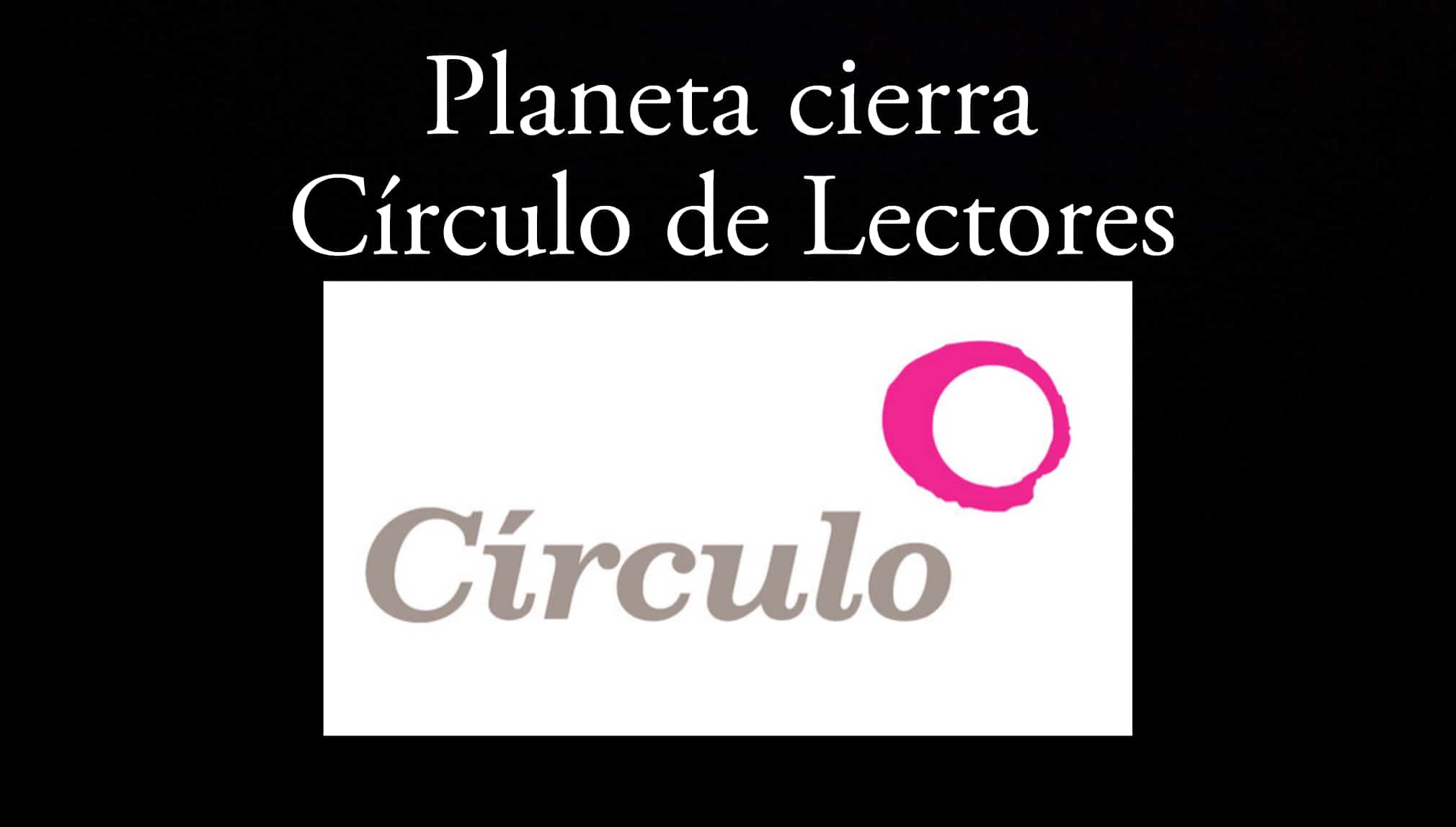
Planet closes Circle of Readers.
Digitization has taken over all areas of humanity's daily life. The current context forces companies and people to live in an environment in constant transformation. Precisely that is Grupo Planeta's argument to justify the closure of the Círculo de Lectores.
Specifically, the publisher's statement refers to to the "change of habits in the consumption of citizens derived from the strong implementation of new technologies". The so-called Industrial Revolution 4.0 has radically modified the economy; the competition is fiercer than ever.
Internet setting the standards
The Internet sets the rules for everything: world trade, communication, means of interaction, pedagogical strategies ... Therefore, it is not surprising that the Círculo de Lectores went from having more than one and a half million subscribers at the end of the last century to around 300.000 at the time of its closure.
The end of a club with more than half a century of history
The Círculo de Lectores was acquired by Grupo Planeta in 2010. At that time they had already developed several projects whose intention was to integrate into electronic commerce and take advantage of the applications of the digital age. However, these strategies did not work mainly due to the unstoppable advancement of tech giants like Amazon.
It mattered little that it was a long-standing club founded in 1962, sustaining it for longer is not profitable. Since 2016, it had an average annual loss of close to 15% for sales and in 2018 a capital increase of 6 million euros was necessary.
Faced with the inability to attract new partners, Grupo Planeta seriously considered a change towards a business model more adapted to the new times. Many Spaniards will miss the largest reading club in their country, as well as its many authorized agents, catalogs, internet forums and spaces for its subscribers in bookstores.
The same burofax that announced the closing of the Circle of Readers offers a dim light of hope to its most faithful members. In one of its paragraphs it reads "fifty thousand things have been tried to improve this model, but it has been decided to close the commercial structure, not to close Círculo, to enter into a process of the future structure (not yet studied)."
So, is it the fault of the new generations?
The easiest thing would be to think that the "changes in consumer habits" are due to the fact that the new generations read less than their parents. However, when analyzing in more detail the reasons for the closure of Círculo de Lectores, it is evident that the fundamental cause is a deficiency in marketing and promotion strategies on digital platforms. They did not adapt in time.
The first obvious piece of information is the prejudice that exists around the so-called millennials (people born between 1980 and 1995) and generation Z (born after 1995). Because, contrary to the expected trend for generations stigmatized as individualistic and disinterested, the millennials They are voracious readers.

The new trend is the "booktubers".
In fact, the portal Biz! Republic Magazine (2019) reported that in the United States alone «80% of young adults ages 18 to 35 have read a book in any format in the last year, including 72% who have read a printed copy. The same source indicates that Americans acquire an average of one to five books a year.
Likewise, Cerezo (2016) states in its publication Generation Z and information that cultural changes are much faster today. It is no longer a matter of decades. The author states: "One of the great novelties that the current transformation brings is its speed of expansion, whose impact is immediate and simultaneous in different parts of the planet."
Book clubs are now booktubers
The Ecoosfera portal (2019) describes Generation Y (millennials) as the first global generation, thanks to having grown familiar with the internet and have seen the spread of digitization. Likewise, the world economic crisis and phenomena such as climate change have greatly marked their interests and customs.
Hence, millennials tend to stay well informed on various political and ecological issues. These circumstances have driven the diversification of information sources. It is no longer just books, now virtual libraries, forums and online indexed publications are equally relevant.
In addition, the opinion of the readers is crucial, both to qualify and to make contributions that enrich the value of the information. For this reason, consultants perceive booktubers as very versatile and interactive platforms that bring together all the mentioned aspects.
In the case of the closure of the Circle of Readers of Grupo Planeta, the alternatives to evolve within the digitized world are already available. Perhaps in the not too distant future a return as a booktuber or in a similar business model that can compete within the dizzying Industrial Revolution 4.0 will be possible.
Good afternoon. I need information about how they return the money that I have not used, and that is still accumulated there. Thank you . All the best
The former director of Círculo de Lectores, Hans Meinke, did understand what the future model of Círculo could be: a book club of excellence, which takes care of the art of making good books, well bound, illustrated, accompanied by various cultural activities. Bertelsmann, for its part, is a publishing group that has dedicated itself to the systematic destruction of the publishing world by absorbing a large number of publishers both in Germany and around the world, and particularly the book clubs, which were a specifically German invention to from 1919, although there were precursors, and even more from the postwar years (around 1950), when there was a great boom in this type of sales channel. With the market change and digitalization, Bertelsmann simply decided to slam his original Círculo de Lectores (Bertelsmann Lesering), now only called The Club, after swallowing 95% of the clubs that came to be in Germany, Austria and Swiss. Mediocrity not only prevailed, it also turned out to be an editorial killer. Círculo de Lectores de España was different, because Hans Meinke knew how to copy the model of the still existing Gutemberg Librero Guild (Büchergilde Gutenberg), founded in 1924 (in the same year as Deutsche Buch-Gemeinschaft, swallowed 50% in 1969 by Bertelsmann and annihilated as an independent entity from 1974 to 1988). Like Büchergilde, Círculo published high-quality books, well bound and with a good variety of literary themes or genres. Círculo could have survived with its current 300.000 client-partners maintaining that editorial line of Hans Meinke in the Büchergilde style. But Bertelsmann got rid of the club's bargain price by handing it over to a mediocre publisher: Planeta. Something little understandable, because in Portugal Círculo de Lectores is still in the hands of Bertelsmann (Bertrand), and in Argentina and other countries as well. In France, France Loisirs became the entire property of its founders.
The former director of Círculo de Lectores, Hans Meinke, did understand what the future model of Círculo could be: a book club of excellence, which takes care of the art of making good books, well bound, illustrated, accompanied by various cultural activities. Bertelsmann, for its part, is a publishing group that has dedicated itself to the systematic destruction of the publishing world by absorbing a large number of publishers both in Germany and around the world, and particularly the book clubs, which were a specifically German invention to from 1919, although there were precursors, and even more from the postwar years (around 1950), when there was a great boom in this type of sales channel. With the market change and digitalization, Bertelsmann simply decided to slam his original Círculo de Lectores (Bertelsmann Lesering), now only called The Club, after swallowing 95% of the clubs that came to be in Germany, Austria and Swiss. Mediocrity not only prevailed, it also turned out to be an editorial killer. Círculo de Lectores de España was different, because Hans Meinke knew how to copy the model of the still existing Gutemberg Librero Guild (Büchergilde Gutenberg), founded in 1924 (in the same year as Deutsche Buch-Gemeinschaft, swallowed 50% in 1969 by Bertelsmann and annihilated as an independent entity from 1974 to 1988). Like Büchergilde, Círculo published high-quality books, well bound and with a good variety of literary themes or genres. Círculo could have survived with its current 300.000 client-partners maintaining that editorial line of Hans Meinke in the Büchergilde style. But Bertelsmann got rid of the club's bargain price by handing it over to a mediocre publisher: Planeta. Something little understandable, because in Portugal Círculo de Lectores is still in the hands of Bertelsmann (Bertrand), and in Argentina and other countries as well. In France, France Loisirs became the entire property of its founders.
«» »The first obvious piece of information is the prejudice that exists around the so-called millennials (people born between 1980 and 1995) and generation Z (born after 1995). Because, contrary to the expected trend for generations stigmatized as individualistic and disinterested, millennials are voracious readers.
In fact, the portal Biz! Republic Magazine (2019) reported that in the United States alone "80% of young adults ages 18 to 35 have read a book in any format in the past year, including 72% who have read a print copy" . The same source indicates that Americans acquire an average of one to five books a year. »» »»
Reading a book a year is being a voracious reader? So what will we be those of us who read 2-3 a month?
I agree with the final comment, you think that buying five books a year is being a voracious reader…. where are we going to stop. For me it has been a great shame that they closed the circle of readers since I have been a member for many years, even so I have an electronic book, but where is the paper book, the smell of the new book, touch them and turn pages. The current generation does not read absolutely anything, very very few millennials and generation z (sorry for my misinformation but I thought that millennials were those born after 2000 and something, I never heard about generation z, it sounds like a horror novel) more than anything because I have a 16-year-old son and I see it in him and in many of his colleagues and friends. I do consider myself a voracious reader since I read a book a week, if I like it in five days and if it hooks me from the first page in three or two days even. I lose count of how many I read a year, but five would be a laughingstock
It really hurts that Círculo de Lectores has not adapted to new technologies. I grew up with him, my father kept the magazine, there were no less than two or three books that were left at home, lps of all kinds of music. Thanks Circle of Readers. You will remain in the soul of those of us who love reading and music. Hug from Bogotá.